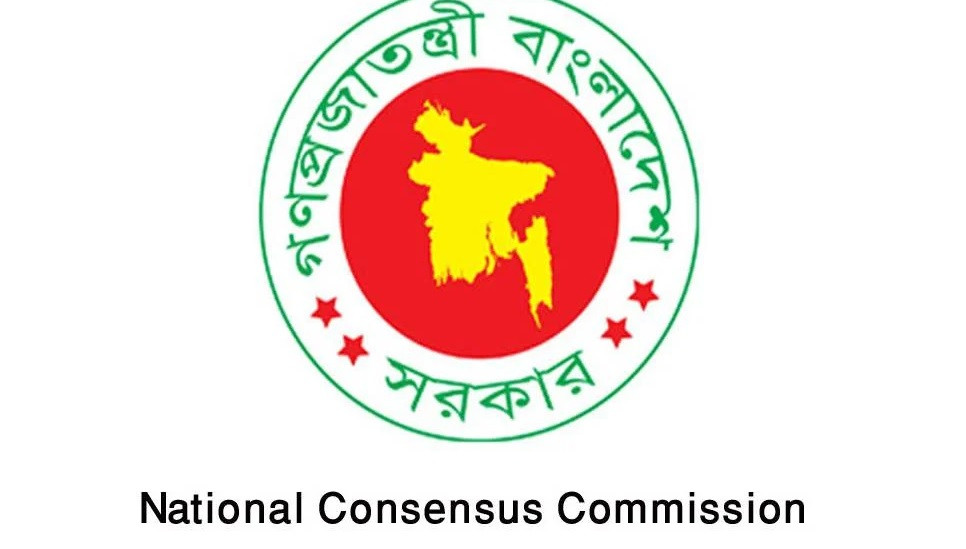National Consensus Commission strives for agreement on state reform proposals
Daily Sun Report, Dhaka
Published: 26 Jul 2025

The National Consensus Commission is making concerted efforts to reach agreement with political parties on proposals for state reform. In response to feedback, the commission has revised its proposals, aiming to reach common ground. One key development is the withdrawal of the earlier proposal to form a National Constitutional Council (NCC). Instead, a new proposal for a constitutional committee to oversee appointments to constitutional and statutory bodies has been introduced.
As even that failed to secure agreement, the commission later proposed forming a selection committee for such appointments. However, BNP and its like-minded parties have objected to establishing such committees for bodies other than the Election Commission, making a full consensus unlikely. The commission is also facing uncertainty over several other key reforms, including the structure of a bicameral parliament.
After the caretaker government assumed power in October last year, six reform commissions were formed covering the constitution, electoral system, judiciary, anti-corruption, public administration, and police. These commissions submitted their full reports by February. Subsequently, a National Consensus Commission was formed under Chief Adviser Dr Muhammad Yunus, comprising the six commission heads, to facilitate political dialogue and draft a "National Charter."
The commission began its work on 15 February, seeking political input on 166 proposed reforms. Written opinions were solicited, and from 20 March to 19 May, 33 parties and alliances participated in the first round of dialogue. A second round began on 3 June, with 18 meetings held so far involving representatives from 30 political parties.
Through these discussions, broad agreement has been reached on several major issues: curbing the Prime Minister’s powers, introducing a caretaker government, limiting the PM’s term, amending Article 70 of the Constitution, reforming the selection process for parliamentary standing committee chairs, regulating the Chief Justice’s appointment, legislating presidential pardon powers, redrawing constituency boundaries, establishing High Court benches in divisional cities, and creating lower courts at the upazila level.
However, several important proposals remain unresolved despite modifications and alternatives. The NCC proposal was dropped due to opposition, and deliberations continue on forming a bicameral parliament—particularly regarding the composition, selection process, and powers of an upper house. Agreement has not been reached on reserved seats for women or their direct election, nor has a final decision been made on the framework for a caretaker government. There are also disagreements over the method of constitutional amendment and presidential election. Parties remain divided on the guiding principles for governance.
Originally, the commission proposed a nine-member NCC to bring transparency and accountability to state affairs and ensure checks and balances. This body would oversee appointments to constitutional and statutory positions. However, citing concerns over reduced executive power, parties including BNP opposed the proposal. The revised idea of a constitutional committee also failed to gain traction. Most recently, on 23 July, a new proposal was introduced.
Initially facing objections, the proposal for a five-member selection committee—headed by the Speaker and including the Prime Minister, Opposition Leader, Deputy Speaker (from the opposition), and a Supreme Court representative—for forming the Election Commission was accepted by all major parties, including BNP. However, BNP and its allies continue to oppose similar selection committees for appointments to the Anti-Corruption Commission (ACC), Public Service Commission (PSC), Comptroller and Auditor General (CAG), and Ombudsman.
Despite objections from parties like the CPB, most have agreed to the commission’s proposed bicameral parliament structure. However, disagreements persist over the electoral process and authority of the upper house. While Jamaat-e-Islami, the National Citizen Party (NCP), and others support proportional representation (PR) for upper house elections, BNP and several others prefer seat distribution based on lower house representation.
According to the commission’s proposal, the upper house would act as a "supervisory layer" to dilute the dominance of the ruling party in the lower house. However, its effectiveness would depend on how its members are elected and what powers it holds. The proposed role is limited to constitutional amendments, but reviewing and recommending legislation could contribute to better law-making. Still, without a PR election model, broader party representation in the upper house is unlikely. Under PR, even parties without lower house seats could win upper house representation based on vote share. BNP and its allies oppose this and want the upper house to reflect lower house seat ratios, further complicating agreement on the bicameral structure.
The commission has clarified that parties may register a "Note of Dissent" in the National Charter on any unresolved issues. Despite opposition from BNP and others, the commission has decided to bar any individual from simultaneously holding the positions of Prime Minister and party chief. A decision on who will head the caretaker government is expected on Sunday. Other unresolved matters will be addressed through dissent notes, and parties will sign the charter accordingly.
National Consensus Commission Vice President Ali Riaz told, "We have reached consensus on several reform proposals and are close on many others. Some proposals remain undecided or opposed by a few parties, who may submit a 'Note of Dissent' for those items in the final charter."
He added: "The commission aims to finalise a National Charter through the broadest possible consensus within the shortest time. We hope to complete this by the end of July, provided political parties continue to cooperate."

